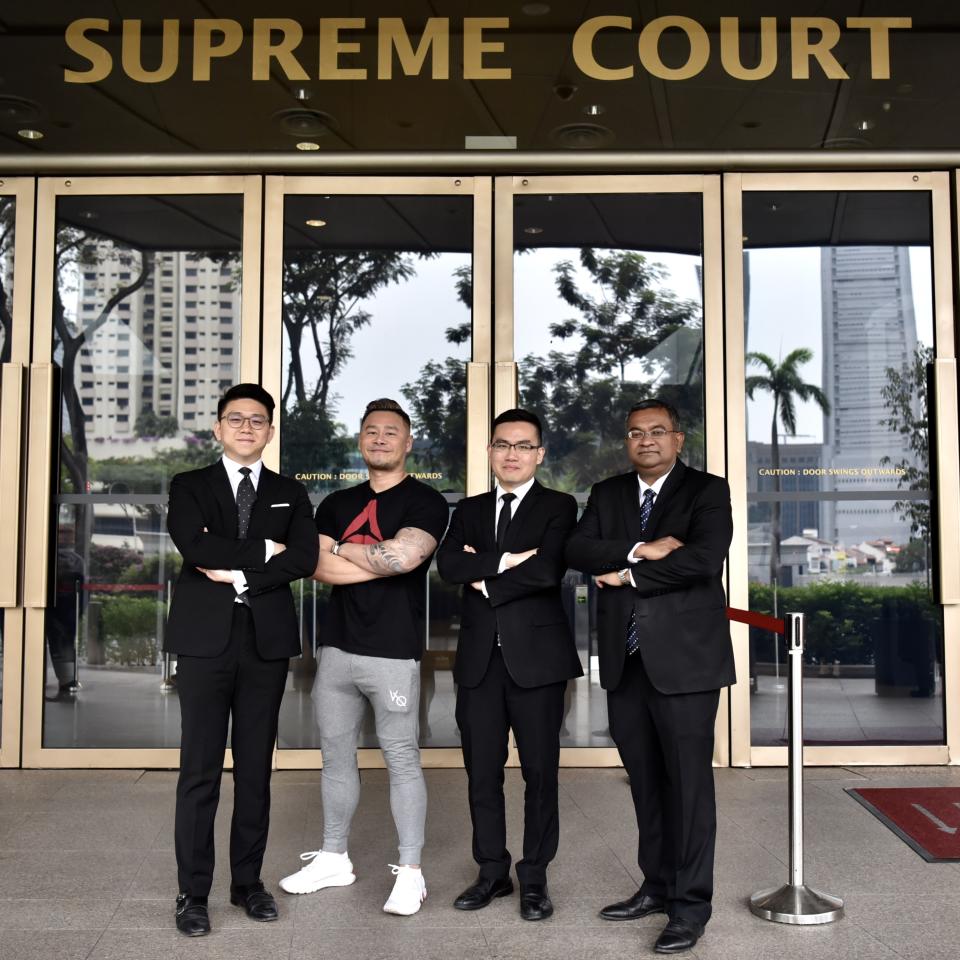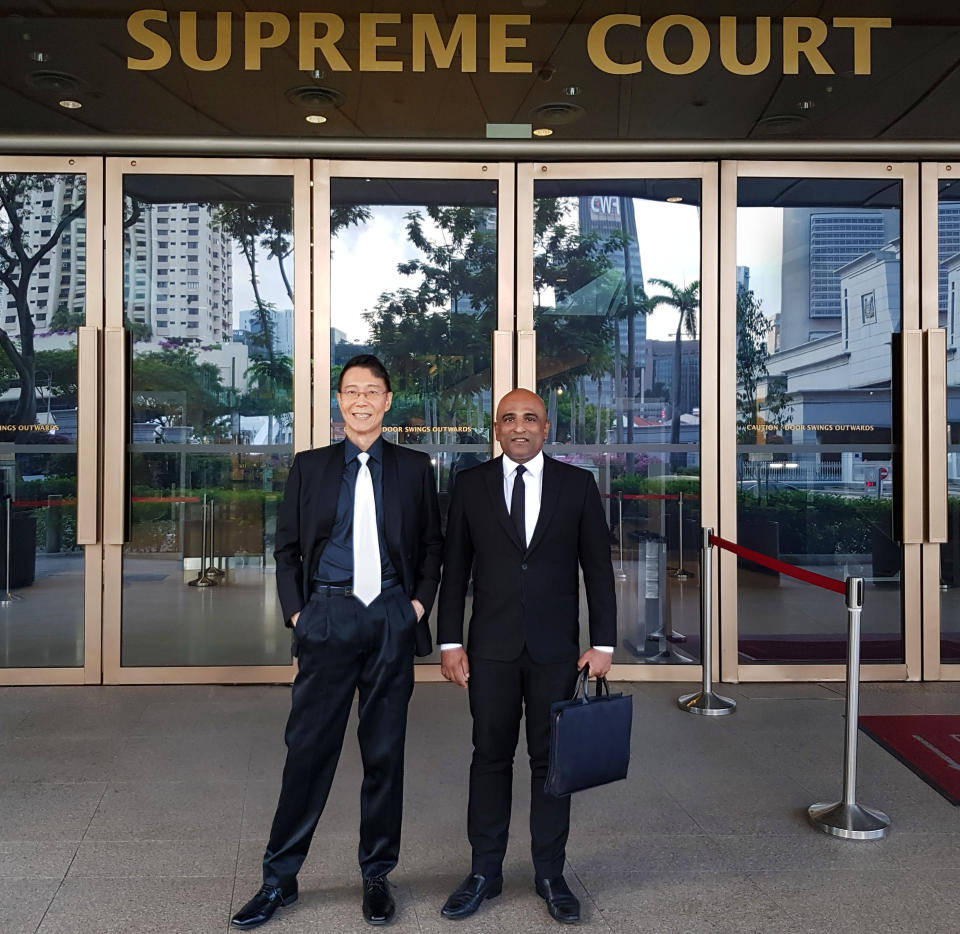Challenges to Section 377A: Key points from this week's hearings

SINGAPORE — Five years after the Court of Appeal threw out two constitutional challenges against Section 377A of the Penal Code, which criminalises consensual sex between men, the High Court heard three more such cases earlier this week.
This time, Bryan Choong Chee Hoong, 42, Johnson Ong Ming, 43, and Roy Tan Seng Kee, 61, are asking the High Court to revisit the apex court’s decision in light of new evidence.
The cases, along with rebuttals from the Attorney-General’s Chambers, were heard in chambers before Justice See Kee Oon between last Wednesday (November 13) and this Wednesday (November 20). The High Court judge is expected to deliver his decision on the challenges some time next year.
The three Singapore cases come a year after the Indian Supreme Court ruled that the Section 377 on its law books was unconstitutional.
Singapore’s Parliament had in 2007 repealed Section 377, which criminalised sexual acts “against the order of nature”, including heterosexual oral and anal sex, but almost unanimously voted to keep Section 377A, which criminalises acts of “gross indecency” between males. Only former Nominated Member of Parliament Siew Kum Hong recorded his dissent to retaining the law then.
In 2014, the Court of Appeal dismissed two constitutional challenges against Section 377A brought about by gay couple Lim Meng Suang and Kenneth Chee Mun-Leon, and separately by Tan Eng Hong.
Several surveys, including one by Yahoo News Singapore last year, show society almost equally split on the issue of whether Section 377A should be repealed. Former Chief Justice Chan Sek Keong, as well as former Attorneys-General Walter Woon and V. K. Rajah, are among those who have argued against retaining the law.
Here’s a brief summary of the three new constitutional challenges before the Singapore High Court, based on court documents made available to Yahoo News Singapore by the lawyers for the three men.
Section 377A was aimed at curbing male prostitution

Relying on documents from the UK national archives that were declassified in 2014 and 2016, the lawyers for Bryan Choong Chee Hoong, a former executive director of non-profit LGBTQ social support group Oogachaga, pointed out that the purpose of enacting section 377A in 1938 by the colonial legislature was to target “rampant” male prostitution among British civil servants here.
Choong’s lawyers, Harpreet Singh Nehal, Jordan Tan, Choo Zheng Xi, Pricilla Chia and Wong Thai Yong, argued that the legislative purpose of the law was never meant to target private, non-commercial sex between consenting men. If the law is then applied to discriminate more generally to cover all consenting homosexuals, it would be overly broad in scope and unconstitutional, they say.
They further contended, among other things, that Section 377A, if interpreted to extend beyond commercial gay sex, would be inconsistent with Article 12 of the Constitution, which guarantees equality before the law and equal protection of the law, and Article 14, which guarantees freedom of expression.
Said Choong’s lawyers in their written submissions, “Section 377A implicates the most intimate personal choices and expressions which male homosexuals have as human beings, i.e. the choice which every other adult has as to whom to love, whom to form relationships with, whom to partner, and how to express intimacy in the context of those relationship choices.
“In this regard, while the law leaves free every other Singaporean to express such choices consistent with their sexual orientation, section 377A brings the force of the criminal law to condemn and limit the choices of a targeted minority i.e. adult, male homosexuals. That is impermissible under Article 14.”
The lawyers added, “Homosexual males...are just like their fellow Singaporeans and deserve the same respect and legal protection under the Constitution. The right to equal treatment and freedom to express love and intimacy should belong to all Singaporeans, including homosexual men. The Constitution protects those rights. Section 377A (if so construed to extend to private, consensual, non-commercial intimacies between male homosexuals) violates those fundamental constitutional protections.”
Homosexuals can’t change sexual orientation

Lawyers for Johnson Ong Ming, a disc jockey and music producer also known as DJ Big Kid, submitted affidavits from various psychiatrists, among other experts, to argue that the preponderance of scientific evidence point to human sexual orientation lying along a continuum, and that sexual orientation and/or attraction cannot be changed.
Ong’s lawyers Eugene Thuraisingam, Suang Wijaya and Johannes Hadi noted, among other things, that females who were exposed to abnormally high levels of of the male hormone androgen while in the womb tend to be sexually attracted to females. Males who were surgically reassigned as females at birth and raised as females tend to remain sexually attracted to females.
Thus, the lawyers argued that sexual orientation is a trait that is similar and analogous to height, intelligence and handedness. Credible scientific studies on epigenetics further support the hypothesis that sexual orientation causes are biological. Social environmental factors also play no role in the causality of male homosexual orientation and/or attraction, the lawyers contended.
In dismissing the two 2014 cases, the apex court had, among other things, agreed with the AGC that there is no definitive evidence pointing clearly to whether sexual orientation was biologically determined.
Ong’s lawyers said that, because Section 377A deprives a person of liberty on the ground of his identity, it is absurd; and because it penalises a person for a trait that is inborn and immutable, it is unconstitutional. Article 9 of the Constitution also guarantees personal liberty.
Furthermore, the threat of prosecution and punishment, including imprisonment, that Ong faces as a gay man, “is real and credible, and not merely fanciful”, the lawyers argued in their written submissions.
In a statement last year, Attorney-General Lucien Wong said the Public Prosecutor retains the unfettered discretion to prosecute for intimate conduct between two consenting adults in private; however, absent other factors present, it does not view such prosecution to be in public interest.
Said Ong’s lawyers, “It does not matter that Section 377A criminalises the intimate acts between males, as opposed to homosexuality itself. It cannot be disputed that the act of engaging in physical intimacy with a person of one’s choosing is a fundamental aspect of the personhood of every human being, heterosexual, homosexual or bisexual.
“Acts of adult same-sex consensual intimate conduct in private do not violate any legally protected right or interest.”
Section 377A ‘doubly criminalises’ gay and bisexual men

Retired general practitioner and LGBT activist Roy Tan Seng Kee, through his lawyer M. Ravi, argued that by retaining Section 377A, gay and bisexual men are “doubly criminalised”.
Section 424 of the Criminal Procedure Code imposes a duty on those who are aware of an arrestable offence being committed, or of the intention of another person to commit such an offence, to immediately report the matter to the police.
Section 377A is included under the list of arrestable offences. Meanwhile, Section 176 of the Penal Code criminalises the omission of giving legally bound notice or information to a public servant.
“By retaining Section 377A, gay and bisexual men are therefore doubly criminalised - on the first level via committing acts prohibited by Section 377A, and on the second level by not reporting these acts to the police,” said Ravi.
“Section 424 of the Criminal Procedure Code also imposes an obligation upon gay and bisexual men to report their intention to have sex or their sexual activities to the police. It also imposes an obligation on the friends, relatives, associates and even neighbours of a sexually active gay and bisexual couple or gay and bisexual men to report the mens’ intention to have sex or their sexual acts to the police,” the lawyer argued.
“This leads to an absurd and arbitrary application of Section 424 on openly gay and bisexual men as it may subject them to surveillance by their acquaintances as well as to the humiliating and degrading acts of enforcement mandated by the law,” he contended.
The Criminal Procedure Code also states police duties where an arrestable offence is suspected: An officer who receives such a report must investigate the case as soon as practicable or, where it is not of a serious nature or there are insufficient grounds for proceeding, record his reasons for not proceeding with the investigation.
Said Tan’s lawyer in his written submissions, “the circumstances in which sexual conduct between consenting men in private will be investigated and/or prosecuted are vague and unpredictable.
“It is accordingly impossible for a gay/bisexual man to predict when he may be investigated for engaging in consensual sexual activity with other men. This unpredictability is, in itself, a serious interference with the liberty of gay and bisexual males and constitutes arbitrary and/or absurd treatment.”
Alternatively, if the police will never investigate allegations of private consensual sex between men, Section 377A is also “absurd and/or arbitrary, since it has no practical effect on law enforcement or any of the alleged aims behind the legislation”, the lawyer argued.
“Instead, it serves only to identify gay and bisexual men as potential criminals and gives rise to fear that they may, one day, be prosecuted.”
‘Scientific knowledge about homosexuality unchanged’
Responding on behalf of the Attorney-General, Deputy Chief Counsel Hui Choon Kuen and AGC officers Denise Wong, Jeremy Yeo and Jamie Pang said, “Each society decides decides its own criminal laws, and in a democratic society that decision is taken by the elected branches of government.”
They added in their written submissions, “Whilst dressed as constitutional objections, the true crux of these (and the previous) Section 377A challenges is whether the treatment of private male homosexual sex acts in Singapore society is a matter for the Singapore courts or the elected representatives of Singapore’s society to decide.”
Alluding to the Indian Supreme Court ruling, the AGC team said the three constitutional challenges, are “apparently prompted by nothing more than a foreign judicial pronouncement based on (a) a written constitution that contains material differences from ours and (b) a judicial activist approach that is completely alien to our legal system.”
The lawyers argued that the High Court is bound by the 2014 Court of Appeal decision, which found that Section 377A does not run foul of the Constitution.
“During this short time, nothing has changed. The law in relation to Articles 9, 12 and 14 of the Constitution of the Republic of Singapore has not changed. The state of scientific knowledge in relation to whether homosexuality is caused by nature or nurture has not changed,” the lawyers said, adding that there is still no definitive evidence pointing clearly to one side of the divide or the other.
Noting that Section 377A criminalises homosexual sex acts and not does not criminalise a person being a homosexual, the lawyers argued: “The fact that a person experiences homosexual attraction just means that he is more inclined to performing homosexual sex acts. Making an act an offence, notwithstanding the fact that there are some persons in society who are more inclined to committing that act, is clearly not uncommon and cannot possibly be considered ‘absurd and arbitrary’.”
Using the example of kleptomania (mental inability to resist the urge to steal), they added, “Regardless of inclination, the performance of the act is a voluntary choice.
“In this regard, it does not matter that kleptomania is classified as a mental disorder and homosexuality is not. That is irrelevant because the point is that inclination to perform an act does not make criminalising that offence ‘absurd and arbitrary’.
“Even if kleptomania were to be, in the future, no longer classified as a mental disorder, it does not make the criminalising of theft ‘absurd and arbitrary’.”
“Whether a statute should be removed from the statute books because it has lost its relevance is a question for Parliament alone, and not for the courts,” they added.
In a media statement on Wednesday at the close of the the hearings, the AGC said it “has fully responded to the arguments raised by the applicants before the court”.
Referencing Tan’s lawyer Ravi’s argument, the AGC added, “The AG has already stated that where the conduct in question was between two consenting adults in a private place, the Public Prosecutor’s position is that, absent other factors, prosecution under s 377A would not be in the public interest.
“It would naturally follow from this position that any prosecution under other provisions which would contradict the non-prosecution position of s 377A would likewise not be in the public interest.”
Related stories:
AG Lucien Wong rebuts views of Walter Woon and V K Rajah on section 377A
LGBT activist Roy Tan files legal challenge against constitutionality of Section 377A
Most Singapore residents favour retaining 377A without enforcement: survey



